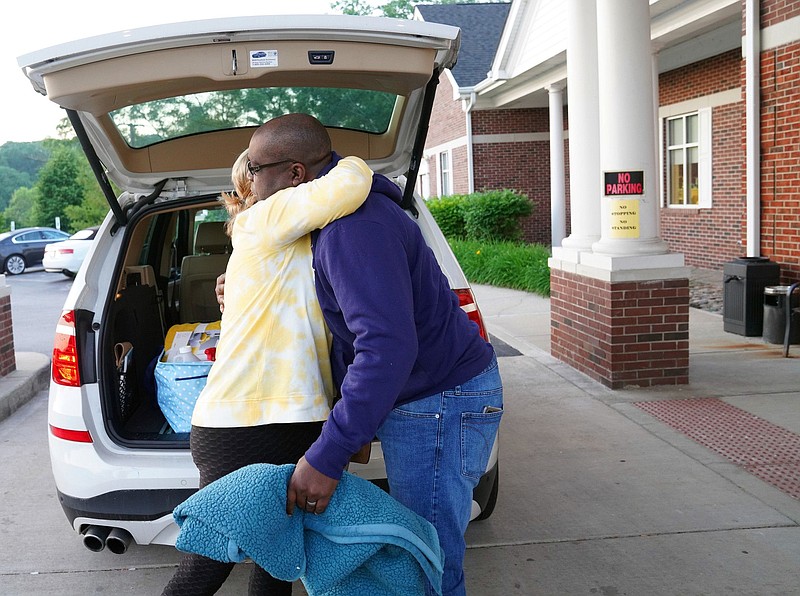NAPERVILLE, Ill. — Aaron and Tonya Rhoden always have big ideas together. They eloped in Hawaii in 2016, when he proposed at sunset on a mountain in Maui, and she wanted to get married the very next day.
Preparing for a kidney transplant together is another life challenge the couple is tackling together. In a surgery later this month, Tonya, 41, will give Aaron, 50, one of her kidneys.
It’s a big moment for the Naperville couple, left in a holding pattern since a 2019 stroke left Aaron partially without the use of his right side and awaiting a kidney transplant. In the meantime, he does dialysis multiple times a week.
They hope the surgery will help them get back to the things they love: traveling places, climbing mountains, swinging golf clubs and seeing family.
They also hope it can show people everyone is the same under our skin, that we can help each other more than we think. The couple says in a time of racial tension, with so much negative news happening in the world, they want to remind people to be kind.
“We all bleed the same,” Tonya said, “all the way down to our organs.”
Their journey began at 3 a.m. July 14, 2019. Aaron had always had high blood pressure, which that morning culminated with a stroke at home. He remembers his body feeling like string taffy. Tonya rushed him to the hospital, where he was told he would either need dialysis or a new kidney.
“That’s the start of the major impact of this story,” he said.
His doctor, Joseph Leventhal, interim chief of organ transplantation at Northwestern Memorial Hospital, said their situation is somewhat unusual.
Transplants involving a spouse or life partner are only a little more than 10 percent of living donor transplants, he said. Beyond this, because the couple is interracial, their match is extra unique because ethnicity can affect tissue type.
“The ability of Tonya to be blood type compatible and a suitable match for her husband, it beat the odds,” he said.
Their situation, Leventhal said, might dispel some myths around organ donation. People do not need to be blood related, or the same ethnicity.
“The beauty of the story is that my DNA is 70-something-percent West African, as an African American, and she’s probably German English American, she’s blond hair and blue eyes, and it’s all coming together,” Aaron said.
The Rhodens want to raise public awareness that more people might be more able to donate and help strangers than they know. Many ways exist to seek organ donation or help others, including sharing a status on social media or what’s called a paired donation, a transplant swap in which a friend or loved one steps up to make a donation to their patient, and is not a recipient, but matches with another pair in the same situation.
“Ordinary people can do extraordinary acts of kindness and love and actually save someone’s life,” Aaron said.
They hope people remember to sign up to be donors on their driver’s licenses; they worry about those without the insurance or support they are lucky to have.
“We can’t help but think about those people every time we drive to dialysis,” Tonya said.
Since Aaron’s stroke, the couple has been on pause from their busy, active regular life.
“We were living our life, and this, coupled with the pandemic, we had to basically cave in to home life,” Aaron said.
His wife added it has been an enormous lifestyle change, “early on in a marriage, having to realize what it really truly means to be with somebody through sickness and health and the daily sacrifices.”
Since they found out he would need a transplant, and that Tonya could be a match, she has changed her habits entirely, hoping to keep her body, and his potential kidney, healthy. No more Reese’s Pieces, no more heavy foods. She lost 25 pounds.
“It went from meat and potatoes to kale and bananas,” she said.
She even quit her real estate job, knowing in the pandemic it would create too much exposure to the virus.
“Our life has been on pause,” she said.
Of his wife’s actions, Aaron said, “I’m undeservedly blessed to have her love in my life.”
A previous date for the surgery had to be pushed back when doctors deemed his body not ready after lab results.
So now, they’re preparing — again — for life to, hopefully, change.
Some ask them if they are scared.
“There’s a certain amount of serenity to it, a certain amount of acceptance to it that kind of quells any kind of fears,” Aaron said.
Back on that Maui mountain, he knew they were, he said, “destined by God to be together.”
“She is my living miracle here on Earth,” he said.
After his surgery, they hope to plan a vacation. She is looking forward to seeing him hold a golf club and watching a movie without him falling asleep.
“I’m looking forward to seeing my husband just live again,” Tonya said.

